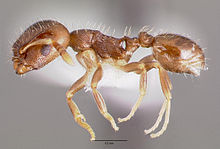Temnothorax americanus
Appearance
| Temnothorax americanus | |
|---|---|

| |
| Temnothorax americanus worker | |
| Scientific classification | |
| Kingdom: | |
| Phylum: | |
| Class: | |
| Order: | |
| Family: | |
| Subfamily: | |
| Genus: | |
| Species: | T. americanus
|
| Binomial name | |
| Temnothorax americanus (Emery, 1895)
| |
Temnothorax americanus is a species of slave-maker ant in the genus Temnothorax. The ants are 2–3 mm in size, and endemic to the northeastern United States and adjacent Canadian regions.[1] T. americanus is a species of slave-maker ant. They do not forage for food, but instead 'scout workers' from the colony seek out nearby host colonies of ants, steal larvae and bring them back to their own colony. A small T. americanus colony could consist of a queen, two to five workers and thirty to sixty slaves.[2]
In a study published in Animal Behaviour, researchers showed that T. americanus scouts target stronger colonies over weaker ones to steal larvae from.[2][3]
It was formerly placed as the sole member of the genus Protomognathus.[4]
References
- ^ Social Insects Specialist Group 1996. Protomognathus americanus. 2006 IUCN Red List of Threatened Species. Downloaded on 10 August 2007.
- ^ a b Davies, Davies (8 November 2010). "Slave-making ants target the strong not the weak". BBC News. Retrieved 21 August 2014.
- ^ Pohl, Sebastian; Foitzik, Susanne (2011). "Slave-making ants prefer larger, better defended host colonies". Animal Behaviour. 81 (1): 61–68. doi:10.1016/j.anbehav.2010.09.006. Retrieved 20 August 2014.
- ^ Ward, Philip S.; Brady, Sean G.; Fisher, Brian L.; Schultz, Ted R. (2015). "The evolution of myrmicine ants: phylogeny and biogeography of a hyperdiverse ant clade (Hymenoptera: Formicidae)". Systematic Entomology. 40 (1): 61–81. doi:10.1111/syen.12090. ISSN 1365-3113.
External links
 Media related to Temnothorax americanus at Wikimedia Commons
Media related to Temnothorax americanus at Wikimedia Commons

